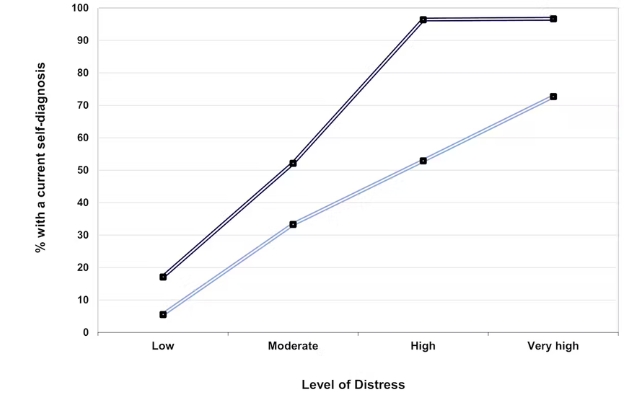Psychological sicknesses similar to despair and anxiousness issues have develop into extra prevalent, particularly amongst younger folks. Demand for therapy is surging and prescriptions for some psychiatric drugs have climbed.
These upswinging prevalence traits are paralleled by rising public consideration to psychological sickness. Psychological well being messages saturate conventional and social media. Organisations and governments are growing consciousness, prevention and therapy initiatives with rising urgency.
The mounting cultural concentrate on psychological well being has apparent advantages. It will increase consciousness, reduces stigma and promotes help-seeking.
Nonetheless, it could even have prices. Critics fear social media websites are incubating psychological sickness and that peculiar unhappiness is being pathologised by the overuse of diagnostic ideas and “remedy converse“.
British psychologist Lucy Foulkes argues the traits for rising consideration and prevalence are linked.
Her “prevalence inflation speculation” proposes that rising consciousness of psychological sickness could lead some folks to diagnose themselves inaccurately when they’re experiencing comparatively delicate or transient issues.
Foulkes’ speculation implies that some folks develop overly broad ideas of psychological sickness. Our analysis helps this view. In a brand new examine, we present that ideas of psychological sickness have broadened in recent times – a phenomenon we name “idea creep” – and that folks differ within the breadth of their ideas of psychological sickness.
Why do folks self-diagnose psychological sicknesses?
In our new examine, we examined whether or not folks with broad ideas of psychological sickness are, in actual fact, extra more likely to self-diagnose.
We outlined self-diagnosis as an individual’s perception they’ve an sickness, whether or not or not they’ve acquired the prognosis from knowledgeable. We assessed folks as having a “broad concept of mental illness” in the event that they judged all kinds of experiences and behaviours to be issues, together with comparatively delicate situations.
We requested a nationally consultant pattern of 474 American adults in the event that they believed that they had a psychological dysfunction and if that they had acquired a prognosis from a well being skilled. We additionally requested about different doable contributing elements and demographics.
Psychological sickness was frequent in our pattern: 42% reported that they had a present self-diagnosed situation, a majority of whom had acquired it from a well being skilled.
(Psychological Well being America/Pexels)
Unsurprisingly, the strongest predictor of reporting a prognosis was experiencing comparatively extreme misery.
The second most vital issue after misery was having a broad idea of psychological sickness. When their ranges of misery had been the identical, folks with broad ideas had been considerably extra more likely to report a present prognosis.
The graph under illustrates this impact. It divides the pattern by ranges of misery and exhibits the proportion of individuals at every degree who report a present prognosis.

Individuals with broad ideas of psychological sickness (the very best quarter of the pattern) are represented by the darkish blue line. Individuals with slim ideas of psychological sickness (the bottom quarter of the pattern) are represented by the sunshine blue line.Individuals with broad ideas had been more likely to report having a psychological sickness, particularly when their misery was comparatively excessive.
Individuals with higher psychological well being literacy and fewer stigmatising attitudes had been additionally extra more likely to report a prognosis.
Two attention-grabbing additional findings emerged from our examine. Individuals who self-diagnosed however had not acquired knowledgeable prognosis tended to have broader sickness ideas than those that had.
As well as, youthful and politically progressive folks had been extra more likely to report a prognosis, per some earlier analysis, and held broader ideas of psychological sickness. Their tendency to carry these extra expansive ideas partially defined their increased charges of prognosis.
Why does it matter?
Our findings help the concept expansive ideas of psychological sickness promote self-diagnosis and will thereby enhance the obvious prevalence of psychological ailing well being. Individuals who have a decrease threshold for outlining misery as a dysfunction usually tend to determine themselves as having a psychological sickness.
Our findings don’t instantly present that folks with broad ideas over-diagnose or these with slim ideas under-diagnose. Nor do they show that having broad ideas causes self-diagnosis or leads to precise will increase in psychological sickness. Nonetheless, the findings elevate vital issues.
First, they recommend that rising psychological well being consciousness could come at a value. Along with boosting psychological well being literacy it could enhance the chance of individuals incorrectly figuring out their issues as pathologies.
Inappropriate self-diagnosis can have adversarial results. Diagnostic labels could develop into identity-defining and self-limiting, as folks come to consider their issues are enduring, hard-to-control elements of who they’re.

Second, unwarranted self-diagnosis could lead folks experiencing comparatively delicate ranges of misery to hunt assist that’s pointless, inappropriate and ineffective. Current Australian analysis discovered folks with comparatively delicate misery who acquired psychotherapy worsened extra typically than they improved.
Third, these results could also be significantly problematic for younger folks. They’re most liable to carry broad ideas of psychological sickness, partially on account of social media consumption, and so they expertise psychological ailing well being at comparatively excessive and rising charges.
Whether or not expansive ideas of sickness play a job within the youth psychological well being disaster stays to be seen.
Ongoing cultural shifts are fostering more and more expansive definitions of psychological sickness. These shifts are more likely to have blended blessings. By normalising psychological sickness they might assist to take away its stigma. Nonetheless, by pathologising some types of on a regular basis misery, they might have an unintended draw back.
As we wrestle with the psychological well being disaster, it’s essential we discover methods to extend consciousness of psychological ailing well being with out inadvertently inflating it.![]()
Jesse Tse, PhD Candidate at Melbourne Faculty of Psychological Sciences, The College of Melbourne and Nick Haslam, Professor of Psychology, The College of Melbourne
This text is republished from The Dialog below a Artistic Commons license. Learn the unique article.

